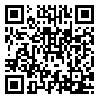Volume 14, Issue 48 (8-2024)
erj 2024, __(48): 245-264 |
Back to browse issues page
Download citation:
BibTeX | RIS | EndNote | Medlars | ProCite | Reference Manager | RefWorks
Send citation to:



BibTeX | RIS | EndNote | Medlars | ProCite | Reference Manager | RefWorks
Send citation to:
Developing a model of structural relationships the mediating role of emotional self-awareness and responsibility in the relationship between sense of coherence and self -compassion with academic well-being. erj 2024; 14 (48) :245-264
URL: http://erj.khu.ac.ir/article-1-864-en.html
URL: http://erj.khu.ac.ir/article-1-864-en.html
Abstract: (3456 Views)
Academic well-being is an important variable in the field of education and learning, whose underlying factors must be identified. Therefore, the aim of this study was to investigate the structural relationship between sense of coherence, self-compassion, emotional self-awareness with academic well-being. This descriptive correlational study was performed on students of Tabriz University of Medical Sciences. A number of 350 students (181 males and 169 females) who were selected through multi-stage sampling method completed the questionnaires of sense of coherence by Antonovsky, self-compassion by Neff, emotional self-awareness by Grant et al, responsibility by gough, academic burnout inventory by Salmela-Aro et al, and schoolwork engagement inventory by Salmela-Aro & Upadya. The data were analyzed using structural equation modeling method. The hypothetical model of academic well-being provided a good fit to the research population (X2/df=2/12, RMSEA=0/05). Direct path of sense of coherence, emotional self-awareness and responsibility to academic well-being was significant. But, direct path of self-compassion wasn't significant. Indirect path of sense of coherence with mediating role of emotional self-awareness and responsibility to academic well-being was significant. Also, indirect path of self-compassion with mediating role of emotional self-awareness to academic well-being was significant. Given the direct and indirect effect of sense of coherence, self-compassion, emotional self-awareness and responsibility on the academic well-being, it seems that reinforcement of emotional self-awareness, self-compassion, sense of coherence and responsibility may enhance student’s academic well-being.
Keywords: Academic Well-being, emotional self-awareness, sense of coherence, self-compassion, responsibility
Type of Study: Research Paper |
Subject:
Educational Psychology
Received: 2020/08/25 | Revised: 2025/05/4 | Accepted: 2024/02/12 | ePublished: 2024/10/29
Received: 2020/08/25 | Revised: 2025/05/4 | Accepted: 2024/02/12 | ePublished: 2024/10/29
| Rights and permissions | |
 |
This work is licensed under a Creative Commons Attribution-NonCommercial 4.0 International License. |



